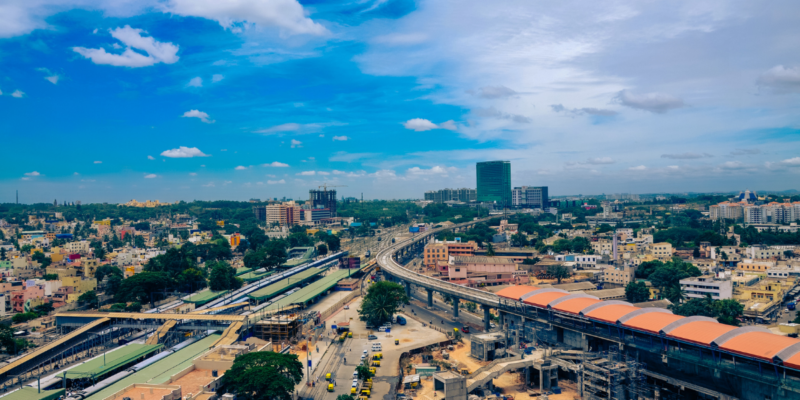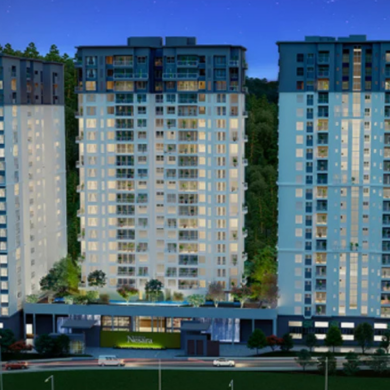
Bangalore real estate market 2025 offers high-potential opportunities for both homebuyers and investors – with strong demand, infrastructure growth, tech adoption, and sustainability.
Driven by strong residential demand, infrastructure upgrades, and steady commercial expansion, Bangalore’s real estate market is expected to continue its momentum in 2025. Evolving needs of urban dwellers and rise in premium housing choices are expected to further shape market trends across key areas in the months ahead. In this blog, we explore the key trends shaping the Bangalore real estate market 2025, offering insights for both homebuyers and investors.
Table of Contents
Key Factors Driving Bangalore Property Trends 2025
Real estate growth is underpinned by a blend of infrastructural, economical, and lifestyle factors that continue to elevate Bangalore real estate investment appeal.
- Infrastructure Development: Ongoing projects play a pivotal role in driving the future of real estate in Bangalore – for example Namma Metro Phase 2 and Phase 3, improved road connectivity, Satellite Town Ring Road, Bangalore-Chennai Expressway NE7, and more. These enhancements reduce travel times and boost accessibility to emerging localities.
- IT and Startup Ecosystem: The city’s reputation as India’s Silicon Valley continues to attract professionals, increasing the demand for housing and commercial spaces. This trend directly impacts the future of Bangalore real estate investment.
- Growing Localities: Areas like Sarjapur Road, ORR, Whitefield, and North Bangalore are prime investment destinations, with diverse pricing and promising growth prospects.
- Increased Investment Opportunities: Investors eyeing Bangalore property prices 2025 are focusing on strategic locations with strong infrastructure, connectivity, and growth potential. As demand rises across key locales, long-term gains are expected to remain promising for well-informed buyers.
- Rising Demand for Luxury Housing: Changing lifestyle preferences, growing rental costs, and higher disposable incomes have led to increased interest in premium housing projects – further enhancing Bangalore real estate investment growth.
Residential Domain – Bangalore Real Estate Market 2025
According to the Hindustan Times’ Real Estate Outlook 2025, rental dynamics in Bangalore’s residential market are shifting significantly in 2025, especially across emerging corridors. After witnessing a strong surge of 20-30% in rentals during 2023-24, the city experienced a brief stabilisation phase due to increased housing inventory. These shifts reflect broader Bangalore property trends 2025, highlighting evolving demand patterns and supply adjustments.
North Bangalore continues to draw attention, with areas like Devanahalli, Bagalur, and Nelamangala seeing rising demand, driven by their proximity to the airport and employment hubs like Manyata Tech Park. Rental rates here are expected to appreciate by 20-25%, supported by major commercial setups and corporate relocations.
Whitefield and Sarjapur Road are also becoming popular rental destinations. Localities like Panathur Road and Bhoganahalli are seeing growing interest from IT professionals due to accessibility and gated communities. Monthly rents for 2BHK start at ₹35,000 – with projected appreciation of 10-20% this year.
Strategically located areas such as Koramangala, Indiranagar, and HSR Layout remain strongholds for mid to luxury segment tenants, though limited inventory continues to push prices upward. Bangalore property prices 2025 are likely to mirror these trends, with central zones commanding a premium and emerging corridors witnessing faster appreciation.
Commercial Domain – Bangalore Real Estate Market 2025
Strong demand, rising rents, and shrinking vacancies are reshaping commercial property investment decisions in 2025. With Bangalore leading the country in office space demand at 28%, you gain access to a high-growth market backed by strong fundamentals.
Vacancy rates have dropped to their lowest in 14 quarters, and rents have crossed ₹100 per sq ft, making commercial spaces more competitive than ever, as stated in this Business Standard article.
Impact of Infrastructure Projects in Bangalore 2025
Wider roads, seamless metro connectivity, and enhanced public transport are redefining property choices across the city. In 2025, major infrastructure projects such as Namma Metro Phase 2 & 2A, Peripheral Ring Road (PRR), and Bangalore Suburban Railway Project are playing a key role in improving accessibility and reducing commute times.
You also benefit from enhanced regional connectivity through Bangalore-Mysore Expressway, Satellite Town Ring Road (STRR), and Whitefield-Kolar Corridor (STRR Link). Additionally, upcoming elevated corridors and signal-free corridors are set to ease bottlenecks across major junctions, further cutting down travel time.
These upgrades allow you to explore high-potential areas that were once considered remote or developing. As they take shape, your Bangalore real estate investment will experience higher appreciation.
9 Key Localities of Bangalore to Watch in 2025
As Bangalore property trends 2025 continue to favour well-connected and future-ready locations, here is an overview of the top localities driving the future of real estate in Bangalore:
- Koramangala: One of the city’s most vibrant and upscale neighbourhoods, Koramangala is known for its startup culture, excellent connectivity, and premium social infrastructure. It enjoys strategic proximity to major roads such as Intermediate Ring Road, ORR, Sarjapur Road, and Hosur Road, offering seamless access to Central Bangalore, Indiranagar, HSR Layout, Bellandur, and Electronic City. Located in this prime area, SOBHA Infinia brings contemporary design and high-rise luxury living to the heart of the city’s most desirable address.
- Sarjapur Road: Connectivity to major IT corridors like Outer Ring Road and Electronic City have enhanced the investment appeal of this area. With prominent educational institutions, healthcare facilities, and retail spaces, this area is expected to play a significant role in real estate in Bangalore 2025 – especially for families and professionals.
- Electronic City: Known as a diverse yet well-connected IT hub, this area continues to attract IT professionals and investors alike. With enhanced connectivity via the elevated expressway and Namma Metro Yellow Line, it is poised for significant appreciation.
- Hosur Road: Stretching 32 km from Brigade Road to Attibele, Hosur Road is part of Delhi-Chennai NH48, and links Bangalore to one of the largest industrial hubs of Tamil Nadu. Managed by NHAI, BBMP, and BDA, it features the BETL elevated expressway from Silk Board to Electronic City. With signal-free flyovers and underpasses, it offers smooth access to Bommanahalli, Electronic City, and Anekal. Located in this high-growth corridor, SOBHA Townpark offers premium high-rise living and a multitude of modern amenities for all age groups.
- Outer Ring Road: This remains a vital corridor for commercial and residential growth. With numerous IT parks, corporate offices, and ongoing infrastructure upgrades like Namma Metro Blue Line, ORR is a key region shaping the future of Bangalore real estate. It attracts both high-income professionals and businesses seeking strategic locations.
- Whitefield: A prime destination for both residential and commercial developments, Whitefield offers excellent connectivity through Namma Metro Purple Line and the upcoming Blue Line, access to major IT parks, and growing social infrastructure such as malls and schools. As a key player in Bangalore real estate investment, this area is witnessing consistent demand for mid-range and luxury housing.
- Hebbal: This has become a prominent real estate hub in North Bangalore, thanks to its strategic location near Hebbal Lake, Manyata Tech Park, and Kempegowda International Airport. The Hebbal flyover ensures seamless travel, benefitting areas such as Nagawara, RT Nagar, and Yelahanka. With Manipal Hospital, Aster CMI Hospital, and Esteem Mall, it offers a balanced lifestyle.
- Yelahanka: This is another area in North Bangalore that blends heritage with modern growth. Well-connected to Hebbal and the airport via NH44, it offers access to key institutions, Yelahanka Railway Station, and green zones & lakes. Its strategic location and infrastructure make it a preferred choice for residential investment.
- Devanahalli: Proximity to Kempegowda International Airport, the Aerospace SEZ, and robust infrastructure developments like Peripheral Ring Road and Satellite Town Ring Road have made Devanahalli important to Bangalore real estate market 2025 forecast. Upcoming IT parks and industrial zones further solidify its growth potential.
Read More: Top 10 Posh Areas in Bangalore
Technology & Smart Homes in Bangalore
Technology is playing a pivotal role in shaping Bangalore real estate market 2025, enhancing both buyer experience and operational efficiency for developers.
- PropTech Solutions: Innovative platforms simplify property transactions, enhance transparency, and provide AI-based property recommendations
- Smart Infrastructure: Developers are integrating IoT systems into projects, aligning with the demand for smart homes – one of the key Bangalore property trends 2025
- Data-driven Decisions: Advanced analytics are enabling developers and investors to identify opportunities in areas such as Whitefield and Electronic City
- Automation in Construction: Technologies like modular construction are accelerating project timelines, improving cost efficiency, and aligning with the growth trajectory of Bangalore real estate market 2025
Sustainability and Green Real Estate Initiatives in Bangalore
Lower energy bills, better air quality, and smarter living choices are shaping the views of homebuyers, tenants, and investors. With the BBMP’s Climate Action Cell (CAC) leading the way, sustainability is no longer an afterthought but a driving force in urban planning. From tools like the Rooftop Solar Explorer to the upgraded Lake and Park Management Systems, you now have better access to clean energy insights and well-maintained green zones near your home.
BBMP CAC’s initiatives such as Nisarga chatbot and Mapathon Guidebook empower you to participate in shaping a greener city, while their BluGreenUru Awards celebrate and inspire responsible development.
As public and private efforts converge to create more eco-conscious communities, Bangalore property prices 2025 are expected to reflect this shift – rewarding future-ready, sustainable choices with long-term value and investment returns.
Legal & Regulatory Updates that Impact Bangalore’s Real Estate
Bangalore property trends 2025 indicate significant transformation due to recent legal and regulatory updates. Here is how these updates impact your property decisions:
- Enhanced Floor Area Ratio (FAR): The Karnataka government has increased the permissible FAR by up to 60%, allowing for taller buildings and maximising land use. While this opens up more housing and commercial options, Bangalore property prices 2025 may be influenced by how well infrastructure keeps pace with this vertical expansion.
- Mandatory E-Khata for Property Registrations: e-Khata system has become mandatory for all property registrations within BBMP limits. This digital initiative aims to improve transparency and reduce fraudulent transactions.
- Stricter Khata Registration Guidelines: BBMP has tightened guidelines for registering A-Khata and B-Khata properties, aligning with amendments to the Karnataka Town and Country Planning Act. Now, properties require prior approval from planning authorities for registration, aiming to curb unauthorised constructions and ensure compliance with urban planning norms. This regulatory shift is shaping Bangalore property trends 2025, with buyers prioritising legal clarity and approved developments.
Investment Opportunities & Risks in Bangalore, in 2025
Better infrastructure, thriving IT corridors, and shifting lifestyle preferences are opening new avenues for property investments in 2025. Areas like North Bangalore, Koramangala, and Sarjapur Road offer strong potential, thanks to growing connectivity and demand for premium housing. You can benefit from rising rental yields, long-term capital appreciation, and expanding commercial zones.
However, stay mindful of risks such as delayed project deliveries, water scarcity concerns, and regulatory changes like e-Khata enforcement and FAR norms. By tracking upcoming developments and choosing credible developers, you can take informed decisions and maximise your Bangalore real estate investment. Furthermore, Bangalore property prices 2025 are expected to reflect both these opportunities and challenges, making due diligence essential for sustained growth.
Future Outlook for Bangalore’s Real Estate Market
This market has a promising future, driven by strong demand for residential and commercial spaces, rapid infrastructure development, and increasing investor interest. The expansion of Namma Metro, Peripheral Ring Road, and Bangalore Suburban Railway is set to boost connectivity and property values in emerging areas such as Devanahalli, Hoskote, and Kanakapura Road.
The city’s thriving IT and startup ecosystem continues to fuel demand for mid-premium and luxury housing – especially in Whitefield, Sarjapur Road, and Koramangala. Bangalore property prices 2025 are also being shaped by evolving buyer preferences – with greater emphasis on location, social infrastructure, and future-readiness.
Conclusion
Bangalore real estate market 2025 presents a balanced mix of opportunity and innovation – driven by infrastructure growth, regulatory clarity, and evolving buyer aspirations. Whether you are looking to invest, upgrade, or relocate, the city offers well-rounded options across residential and commercial segments. With rising demand, improving connectivity, and a shift towards sustainable, tech-integrated living, Bangalore property prices 2025 are expected to reflect this transformation.
FAQs
1. What is the future growth of Bangalore?
The future growth of Bangalore is promising, with steady real estate expansion driven by infrastructure upgrades, housing demand, and commercial activity.
2. Which area in Bangalore is fast developing?
Fast-developing areas in Bangalore are Koramangala, Sarjapur Road, ORR, and Whitefield due to excellent connectivity and presence of job hubs.
3. What is the lifespan of building in Bangalore?
The lifespan of a building in Bangalore is 50-60 years, if built with quality materials and maintained regularly.
4. What is the future of Bangalore real estate in 2025?
The future of Bangalore real estate in 2025 is positive, with rising demand for smart homes, sustainable projects, and well-connected localities.
5. Will property rates increase in 2025?
Yes, property rates will increase in 2025, particularly in high-growth corridors where demand continues to outpace new supply.
6. Will Bangalore real estate prices come down?
Bangalore real estate prices will not come down significantly in 2025, as infrastructure upgrades and high demand maintain steady price appreciation.
7. What will be the real estate market in 2030?
The real estate market in 2030 will be more evolved, with tech integration, sustainability, and strong investor confidence shaping urban development in Bangalore.
8. Is it good to invest in Bangalore real estate?
Yes, it is good to invest in Bangalore real estate, because of its long-term growth, strong rental market, and expanding infrastructure.
9. Is it really worth buying a flat in Bangalore?
Yes, it is worth buying a flat in Bangalore, due to rising property values, good rental returns, and well-developed social infrastructure.
10. Which part of Bangalore is best for investment?
Best parts of Bangalore for investment are Whitefield, Sarjapur Road, Outer Ring Road, and Electronic City due to ongoing development and appreciation potential.









